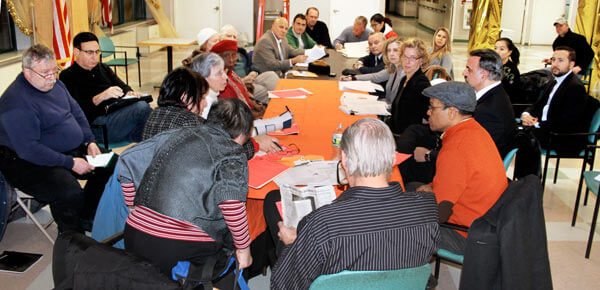By Joe Anuta
Months after a state agency fined two companies working on a brownfield site in Whitestone for importing unauthorized soil onto the property where a high-end residential development is planned, TimesLedger Newspapers has learned that some of the soil in question came from a former Superfund site.
The property in question is called Waterpointe, a proposed development of expensive homes near the corner of 6th Road and 151st Place.
In 2008, with the blessing of the community and local elected officials, the city issued a special permit to allow the construction of the 52 single-family residences contrary to zoning laws. But the property went into foreclosure shortly afterward, a shovel never went into the ground and that special permit expired in December 2012.
A company called Edgestone Group purchased the site for $11 million several months ago and is trying to get the permit renewed, a process that begins by presenting its case to Community Board 7. The board had a meeting Tuesday night where Edgestone pledged to get the site clean and begin construction on the 52 homes and a public waterfront park as soon as possible.
But it inherited a problem.
The property has historically been contaminated and was eventually entered into the state Department of Environmental Conservation’s Brownfield Cleanup Program, which offers incentives for companies to work with the agency to clean up contaminated sites and make them suitable for development.
In June 2011, while the site was in foreclosure, DEC determined that the two companies in charge of replacing the contaminated soil — Massachusetts-based EBI Consulting and Whitestone-based Barone Management, helmed by Scott Barone — had met all the requirements, according to Roberta Gordon, an attorney at Bryan Cave LLP representing the foreclosing bank.
But well before Edgestone acquired the property, additional soil was dumped on top of the DEC-approved material under Barone and EBI’s watch. This eventually led the agency to fine the two companies a total of $150,000, half of which will be nixed if the problems are corrected, and prompted a cleanup of the unauthorized material. Some of that material included soil from a former electroplating facility in Brooklyn, Gordon said Tuesday night.
Documents obtained from the DEC via a Freedom of Information Law request showed that the soil she was referring to came from 154 N. 7th St. in Brooklyn.
That is the same address where in 1997 a company called All Plating Corp. was abandoned and the U.S. Environmental Protection Agency later cleaned up leaking hazardous materials under its Superfund program, according to the EPA. A Superfund site is a hazardous waste site that poses harm to surrounding communities and is cleaned up under the EPA.
“[EPA] … found an incompatible mix of heavy metals, acids, corrosives and other hazardous materials improperly stored in leaking drums and bags,” the agency said in a 1998 news release. “Several open vats and tanks containing a variety of chemicals and heavy metals are also inside the deteriorated building where fires and vandalism have occurred. Two trailers are parked outside the building that contain corrosives and acids in pails and drums.”
In two instances, Barone told TimesLedger Newspapers that the fine from DEC and subsequent required cleanup were due to a paperwork error. In essence, Barone Management and EBI did not do enough testing on the material it brought in to satisfy DEC requirements, he said.
But Gordon said at Tuesday night’s meeting that DEC would never have allowed material from a former Superfund site to enter a Brownfield Cleanup site, no matter how many tests were done.
A new environmental company overseeing the site estimated that removing the unauthorized material would take between weeks and months and would cost at least about $500,000.
Reach reporter Joe Anuta by e-mail at januta@cnglocal.com or by phone at 718-260-4566.

































